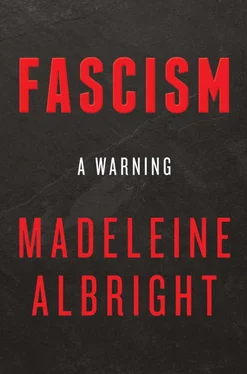There are those who consider Trump to be an unintelligent man. I make no such accusation. I do, however, confess to concern about his steadiness and the transparent brittleness of his ego. Publicly, to date, his record of achievement is sparse, but the president admits to no doubts about how well he is doing. His comment to the New York Times : “So I go to Poland and make a speech. Enemies of mine in the media, enemies of mine are saying it was the greatest speech ever made on foreign soil by a president.” To Fox News regarding the record number of high-level vacancies in the State Department: “I’m the only one that matters.” To Time magazine: “I’m a very instinctual person, but my instinct turns out to be right.” To the whole world on Twitter, I’m “a very stable genius.”
Genius or not, this presidency has often been painful to observe. I find it shocking to cross the Atlantic and hear America described as a threat to democratic institutions and values. A month after Trump’s inauguration, the head of the European Council listed four dangers to the EU: Russia, terrorism, China, and the United States. In the wake of one Trump visit, an exasperated Angela Merkel said, “The times in which we can fully count on others are somewhat over.” Since early 2017, surveys show a marked decline in respect for the United States. In Germany, belief that the American president can be counted on to do the right thing shrank from 86 percent under his predecessor to 11 percent under Trump. In France, the fall was from 84 percent to 14; in Japan, 74 to 24; in South Korea, 84 to 17.
It is true that Trump has learned while in office. At times, he has shown real awareness of the gravity of his responsibilities. He deserves credit for preserving Crimea-related sanctions against Russia, sending arms to a beleaguered Ukraine, and managing an effective military campaign against ISIS. In December 2017, he implemented a law, the Global Magnitsky Act, that imposes penalties on individuals and entities accused of corruption and human rights violations. Beneath the headlines, many U.S. positions on other important issues have gone unaltered. Too often, however, Trump has attempted to fulfill campaign promises that he should never have made. The list is a long one and includes: renunciation of the Paris Climate Agreement; putting at risk the benefits of the North America Free Trade Agreement; badmouthing the Iran nuclear pact; squandering resources on the Mexico wall; trying to ban Muslim immigrants; and proposing to slash our budget for diplomacy, development, and environmental health. These and other actions have raised widespread questions about America’s willingness to assist—let alone lead—in solving global problems. If greatness is the objective, we are headed the wrong way.
I am often asked whether I am an optimist or a pessimist. My reply is, “I am an optimist who worries a lot.” I continue to believe that the United States banked enough international goodwill in the interval between George Washington and Barack Obama to recover from the present embarrassment—but I am not sure how extensive or lasting the harm will be, hence the worries.
The potential damage may be of several types. Trump’s election alone cast doubt in international circles on the judgment of the American people and on the reliability of the democratic system to produce defensible outcomes. That is disheartening for pro-freedom activists worldwide and welcome news for autocrats and for other leaders who have major disagreements with the United States.
The commander in chief’s swaggering disregard for how his words are perceived has at times stunned the world, including allies of long standing in Europe and Asia. Our shared interests are so deep that I expect alliance members to continue working with America when possible. However, many of them fear—as I do—that the unilateralist mind-set espoused by Trump will endure in the United States even after the man himself has retired.
The president’s penchant for denigrating other countries has cost America an immense amount of goodwill while boosting the electoral prospects of foreign politicians who express hostility toward Washington and its policies. His animus directed at Muslims is even more harmful because it reinforces the narrative fostered by terrorist leaders that the United States is at war with Islam and wants to hold Muslims down. Early in his term, the president went to the Arabian Peninsula, denounced Iran, sold the Arab establishment some weapons, and called it a historic victory in the fight against violent extremism. It wasn’t. Late in 2017, he recognized Jerusalem as Israel’s capital and said the decision would bring closer the prospect of peace between Israel and the Palestinians. I wish that were the case, but the more likely outcome is a complete loss of credibility for U.S. diplomats as honest brokers within the region.
There is a cost attached as well to Trump’s antiquated ideas on trade. The president is obsessed with correcting imbalances between exports and imports that have little effect on overall prosperity or the creation of well-paying jobs. Instead of focusing on the modernization of commercial agreements, raising labor and environmental standards, and enforcing rules already on the books, the president tosses around insults and ultimatums. His withdrawal from the previous administration’s proposed Trans-Pacific Partnership has contributed to a loss of American prestige in the world’s most dynamic region at a time when President Xi Jinping of China has emerged as the most powerful leader of his country since the apogee of the Qing Dynasty in the eighteenth century. Historically, the United States has served to balance Chinese presence in the Asia-Pacific, but Trump’s scattershot approach to relationships has tarnished America’s image. All the while Beijing has been systematically expanding its economic clout in the Pacific region and also in Central and South Asia, Europe, the Middle East, North Africa, and Latin America—pretty much everywhere. Because of Trump’s “America First” fixation, China can portray itself as a champion of free trade despite having substantially higher tariffs, more rigorous market restrictions, and more onerous barriers to foreign investment than the United States. Because influence in one arena often overlaps into others, I fear that the next U.S. president will inherit a world more inclined to follow Beijing’s lead not only on economic matters but also on lowering norms in such key areas as labor standards, media freedom, religious liberty, and human rights.
It is important to remember that actions taken today depend largely on expectations about the future. If a country feels abandoned by the United States, or uncertain about its leadership, that nation may see a need to act more forcefully—and perhaps unwisely—on its own. At a minimum, the country may see no choice but to invest in what amounts to foreign policy insurance by strengthening ties to others, leaving America on the outside looking in. There is also the chance that intemperate words and ill-conceived threats will ramp up tensions suddenly, induce panic on the part of some, and lead everyone over the cliff to war. There are certainly enough trouble spots—beginning with the Middle East and the Korean Peninsula—to merit anxiety. During the Cold War, we installed hotlines so the U.S. president could allay any misunderstandings by talking directly to a foreign leader. I’m not sure how much faith we would invest in that option today.
Finally, and even more seriously, I fear a return to the international climate that prevailed in the 1920s and ’30s, when the United States withdrew from the global stage and countries everywhere pursued what they perceived to be their own interests without regard to larger and more enduring goals. When arguing that every age has its own Fascism, Italian writer and Holocaust survivor Primo Levi added that the critical point can be reached “not just through the terror of police intimidation, but by denying and distorting information, by undermining systems of justice, by paralyzing the education system, and by spreading in a myriad subtle ways nostalgia for a world where order reigned.” If he is right (and I think he is), we have reason to be concerned by the gathering array of political and social currents buffeting us today—currents propelled by the dark underside of the technological revolution, the corroding effects of power, the American president’s disrespect for truth, and the widening acceptance of dehumanizing insults, Islamophobia, and anti-Semitism as being within the bounds of normal public debate. We are not there yet, but these feel like signposts on the road back to an era when Fascism found nourishment and individual tragedies were multiplied millions-fold.
Читать дальше
Конец ознакомительного отрывка
Купить книгу












